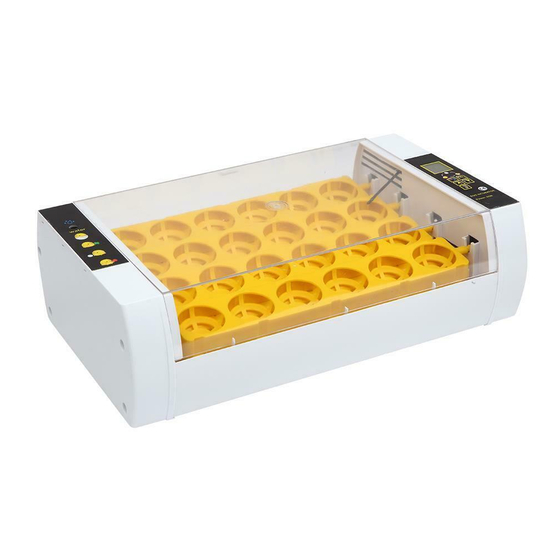HHD 24S 매뉴얼 - 페이지 7
{카테고리_이름} HHD 24S에 대한 매뉴얼을 온라인으로 검색하거나 PDF를 다운로드하세요. HHD 24S 14 페이지. Automatic mini incubator

that the eggshells are soft enough for the chicks to break
through.)
Don't open the lid frequently when the chicks start to
10.
hatch, you could fill water through kettle. If you do, the
loss of humidity will cause the eggshells of the unhatched
eggs to dry out and they won't able to break through the
egg.
Ill. Incubatin ti s
1. Egg and incubator hygiene
Proper hygiene is essential to achieve good hatching results. Poor hygiene causes
chicks to die in their first 10 days of life.
Only clean eggs should be used for incubation. Dirty eggs are potential carriers
of diseases that thrive and multiply in the ideal heat and moisture conditions of
the incubator. If you need to incubate dirty eggs, wash them first in warm water
0
(44-49
C) that contains disinfectant at a rate recommended by the manufacturer
(most household disinfectants are suitable), and dry the eggs quickly after
washing using separate paper towels.
Do not soak eggs for longer than four minutes to avoid affecting fertility and do
not soak eggs in cold water, as it encourages bacterial penetration through the
eggshell.
Fumigating eggs immediately after collection also helps with hygiene. A suitable
fumigant is formaldehyde gas, which is made by mixing 1 part (by weight) of
potassium permanganate (Condy's crystals) with 1.5 parts (by volume) of
formalin (see Table 1 for the correct amounts for each application). Place the
chemicals in a dish on the floor of the incubator. Place the Condy's crystals into
the dish first and then pour the formalin over it. Shut the incubator door quickly
and vacate the room.
For proper fumigation, run the machine normally with the correct temperature
and humidity. After 20 minutes, open the vents or the door and air the machine
for a few minutes. Again, vacate the room.
2. Healthy stock
It is important that eggs from only a healthy flock are used for hatching, as some
diseases can be transmitted through the egg. The egg-transmittable diseases to
be most aware of are salmonella infections, fowl typhoid and Mycoplasma
gallisepticum.
Eggs laid by birds infected with disease may fail to hatch. Of those that do hatch,
some birds may die during brooding, and the survivors may act as carriers and
infect healthy chicks.
Do not add eggs from unknown sources to make up numbers, as you risk
infecting your flock.
Breeding stock nutrition
